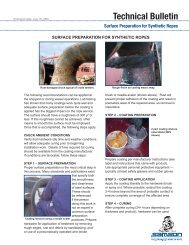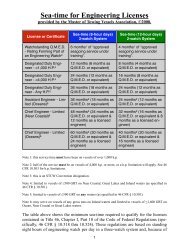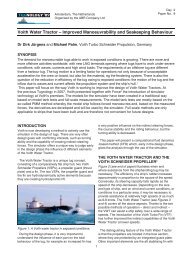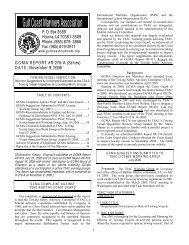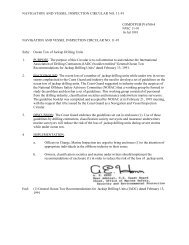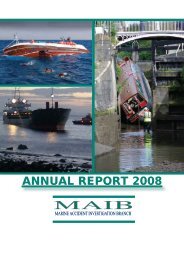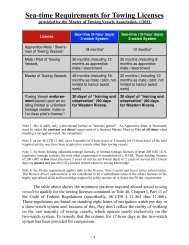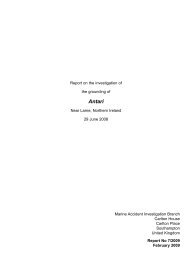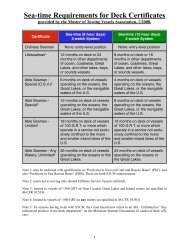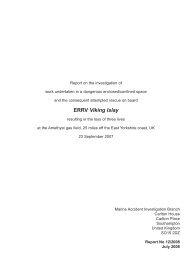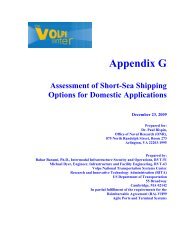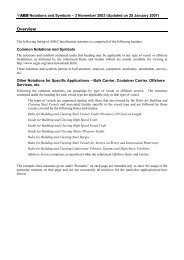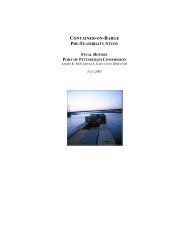R-429-G, Rev. 2 - Towmasters: the Master of Towing Vessels Assoc ...
R-429-G, Rev. 2 - Towmasters: the Master of Towing Vessels Assoc ...
R-429-G, Rev. 2 - Towmasters: the Master of Towing Vessels Assoc ...
You also want an ePaper? Increase the reach of your titles
YUMPU automatically turns print PDFs into web optimized ePapers that Google loves.
<strong>of</strong> information or discourage strictly editorial revisions.Many companies are concerned about <strong>the</strong> appearances <strong>of</strong><strong>the</strong> Smooth Log (Billing Log) <strong>the</strong>y send to <strong>the</strong>ircustomers. Use <strong>of</strong> computers allows company <strong>of</strong>fices topresent a neat, businesslike document to <strong>the</strong>ir customerrepresenting a pr<strong>of</strong>essional corporate image and avoidingembarrassing misspellings or comments <strong>the</strong>y would prefer toremain in house. The result is likely to be a somewhataltered, artificial document designed to project a positiveimage. Even if it contains a Captains signature, thatsignature is likely to reflect <strong>the</strong> company policy <strong>of</strong>maintaining its corporate image. However, <strong>the</strong> vessels<strong>Master</strong> should not be held responsible for any editorialrevisions and/or resulting discrepancies between <strong>the</strong> versionhe submits and <strong>the</strong> version transmitted to <strong>the</strong> customer.Our concern is that <strong>the</strong> Rough Log that remains on <strong>the</strong>vessel and is in a bound-book format with daily or at leastnumbered pages contains and contains a more complete andunvarnished signed account <strong>of</strong> matters <strong>of</strong> concern toInvestigating Officers. Since <strong>the</strong> <strong>Master</strong> <strong>of</strong> <strong>the</strong> vessel mayserve 12 hours standing watch, it is reasonable that entries in<strong>the</strong> Rough Log contain entries by his Mate/Pilot and, onoccasion, as dictated to an unlicensed watchstander on duty.Each entry should be signed and initialed.Coast Guard Regulations on Voyage RecordsCoast Guard Investigators and Boarding Parties shouldhave a reasonable expectation <strong>of</strong> finding voyage recordswhen <strong>the</strong>y board any commercial vessel. The pertinentregulation follows:46 CFR §4.05-15 Voyage records, retention <strong>of</strong>.(a) The owner, agent, master, or person in charge <strong>of</strong> any vesselinvolved in a marine casualty shall retain such voyage recordsas are maintained by <strong>the</strong> vessel, such as both rough and smoothdeck and engine room logs, bell books, navigation charts,navigation work books, compass deviation cards, gyro records,stowage plans, records <strong>of</strong> draft, aids to mariners, night orderbooks, radiograms sent and received, radio logs, crew andpassenger lists, articles <strong>of</strong> shipment, <strong>of</strong>ficial logs and o<strong>the</strong>rmaterial which might be <strong>of</strong> assistance in investigating anddetermining <strong>the</strong> cause <strong>of</strong> <strong>the</strong> casualty. The owner, agent, master,o<strong>the</strong>r <strong>of</strong>ficer or person responsible for <strong>the</strong> custody <strong>the</strong>re<strong>of</strong>, shallmake <strong>the</strong>se records available upon request, to a duly authorizedinvestigating <strong>of</strong>ficer, administrative law judge, <strong>of</strong>ficer oremployee <strong>of</strong> <strong>the</strong> Coast Guard.(b) The investigating <strong>of</strong>ficer may substitute photo staticcopies <strong>of</strong> <strong>the</strong> voyage records referred to in paragraph (a) <strong>of</strong>this section when <strong>the</strong>y have served <strong>the</strong>ir purpose and return<strong>the</strong> original records to <strong>the</strong> owner or owners <strong>the</strong>re<strong>of</strong>.Enclosure 5 to COMDTINST 16.200.3A provides for amaximum penalty <strong>of</strong> $1,000 for violation <strong>of</strong> 46 CFR §4.05-15(a) for failure to retain voyage records <strong>of</strong> a vessel involvedin a marine casualty. GCMA maintains that waiting for acasualty to occur is reactive ra<strong>the</strong>r than pro-active. Part <strong>of</strong>vessel inspection should include an examination <strong>of</strong> <strong>the</strong> roughlogs and o<strong>the</strong>r paperwork in <strong>the</strong> cited regulation to see that it ispresent on <strong>the</strong> boat and at least appears to be maintained withsome degree <strong>of</strong> pr<strong>of</strong>essional care to avoid Horrible Examplesas described below.Horrible Example #1: Towboat “Polaris” SankPolluting & Blocking Channel to Port <strong>of</strong> Iberia[Source: Misle Activity #2383735 & 2606791, June 3, 2005.FOIA #05-1781. GCMA File #R-477 (Consolidated)]The M/V Polaris was a decrepit 92.3 foot 1955 vintagetowboat <strong>of</strong> 211 gross tons with an abominable safety record thatbrought it to <strong>the</strong> attention <strong>of</strong> <strong>the</strong> GCMA Board <strong>of</strong> Directors onat least three occasions. Reports <strong>of</strong> <strong>the</strong>se conditions to <strong>the</strong> localMarine Safety Office brought few results until <strong>the</strong> boat sank in<strong>the</strong> canal blocking <strong>the</strong> Port <strong>of</strong> New Iberia for three days andreleasing 3,000 gallons <strong>of</strong> diesel fuel. An early review <strong>of</strong> vessellogs in previous boardings could have averted <strong>the</strong> disasterbriefly outlined below.According to M/V Polaris logs for that date, <strong>the</strong> vesselarrived in <strong>the</strong> Port <strong>of</strong> Iberia at or about 1230 and <strong>of</strong>floaded itsbarges. This was <strong>the</strong> last logbook entry anyone bo<strong>the</strong>red tomake for <strong>the</strong> day. The POLARIS logs were handwritten onunlined computer paper. They did not list such details as whowas operating <strong>the</strong> vessel or any kinds <strong>of</strong> drills or required tests.The Coast Guard Investigating Officer reported: The logs from<strong>the</strong> Polaris also show a repeated history <strong>of</strong> violation <strong>of</strong> law andregulation by use <strong>of</strong> unlicensed individuals as masters <strong>of</strong> <strong>the</strong>vessel. The logs were kept as pay logs and were based ongrade on <strong>the</strong> vessel. On <strong>the</strong>se logs, ¢ identifies himself asbeing on <strong>the</strong> wheel <strong>of</strong> <strong>the</strong> vessel. Mr. ¢ does not possess aCoast Guard license.The evidence in this case reveals misconduct <strong>of</strong> <strong>the</strong>crew and <strong>the</strong> operator <strong>of</strong> <strong>the</strong> Polaris. Repeated vessel safetyand integrity problems were addressed in a substandardmanner, which led (to) <strong>the</strong> condition under which <strong>the</strong> vesselsank, The crew knowingly violated regulation in relation tooperation without proper documentation.. Civil penaltiesagainst <strong>the</strong> lessee <strong>of</strong> <strong>the</strong> Polaris were considered but (he)passed away in an auto accident on September 21, 2005.Penalty action against Mr. ¢ was initiated for unlicensedoperation.Horrible Example #2: Ask Nothing, Expect Nothing[Enclosure #1] is a page from <strong>the</strong> Rough Log <strong>of</strong> one <strong>of</strong><strong>the</strong> largest <strong>of</strong>fshore tugboats operating in <strong>the</strong> Gulf <strong>of</strong>Mexico. The vessel is described fur<strong>the</strong>r in <strong>the</strong> enclosure.Any Coast Guard <strong>of</strong>ficer investigating an accident mightfind only a minimal amount <strong>of</strong> information to support anaccident, injury, or personnel investigation in reviewing sucha logbook on scene. He might or might not have access to<strong>the</strong> vessels Smooth Log. In any event, <strong>the</strong> information hemay be seeking should probably be in <strong>the</strong> Rough Log.A number <strong>of</strong> investigators express frustration in <strong>the</strong> lack<strong>of</strong> information, <strong>the</strong> wide use <strong>of</strong> abbreviations that are nonstandardand not catalogued, illegibility, lack <strong>of</strong> care andattention to detail, and lack <strong>of</strong> signatures identifying <strong>the</strong>person or persons making <strong>the</strong> entries. Since <strong>the</strong> Coast Guardis tasked with investigating a variety <strong>of</strong> occurrences, <strong>the</strong>yneed to have greater access to usable information.A <strong>Master</strong> has reason to fear for his job if he makescertain entries on a Smooth Log that he transmits within aday or so to <strong>the</strong> front <strong>of</strong>fice and will be reviewed by hisemployer. The <strong>Master</strong> submits <strong>the</strong>se logs and will be heldresponsible for <strong>the</strong>m.At <strong>the</strong> same time, <strong>the</strong> <strong>Master</strong> also requisitions spare repairparts, services, supplies and groceries that he may note in <strong>the</strong>7 February 2007



